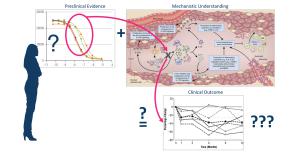Rosa and Co.’s Dr. Christina Friedrich to present the power of QSP modeling at the AAPS Annual Meeting
Case studies show how PhysioPD™ Research saves time and money, and provides critical information when a clinical trial is not an option.
“We are excited to present the conclusions of two case studies at a premier event such as AAPS PharmaSci 360,” said Christina Friedrich, Rosa & Co’s Chief Engineer. “Our results reveal how PhysioPD Research reduces risk and increases confidence in drug development as well as delivers significant insights when a clinical trial is not a possibility, as is the case for analyzing outcomes of intervention after an opioid overdose.”
In a presentation entitled "How does QSP Modeling Support R&D Decisions? Case examples of modeling impact in the central nervous system and inflammatory diseases", Dr. Friedrich will discuss results focused on psoriasis drug development as well as intervention after an opioid overdose. In both projects, PhysioPD Research - Rosa’s brand of QSP modeling – increased confidence to develop successful clinical trials and product submissions through an improved understanding of how drug mechanisms influence clinical outcomes.
The first project utilized PhysioPD Research to elucidate the value of novel psoriasis therapies as well as identify mechanistic drivers of response. Impact on development included shortening of a psoriasis clinical trial, and associated time and money savings. Importantly, this project sheds light on when a novel drug may not be sufficiently effective. The results further provided suggestions of key experiments to test these assumptions as well as helped clarify the types of patients that may be the strongest responders.
The second project demonstrated the efficacy of higher-dose naloxone, an opioid receptor antagonist used to treat opioid overdose, without a clinical trial. PhysioPD Research was used to evaluate the effect of naloxone on mu opioid receptor occupancy under a range of assumptions. Notably, Rosa’s modeling predicted the efficacy of higher-dose naloxone in preventing deaths from an opioid overdose, providing valuable supporting information for regulatory submission in a situation where a clinical trial is not an option. The evidence obtained through this project is currently being used for conversations with regulators and to potentially save time, money, and lives by bringing a higher-dose naloxone product to the market efficiently.
Important lessons from these two projects include:
1) The importance of PhysioPD Research for integrating mechanistic and clinical data to investigate new targets, compounds, or protocols
2) The power of models to reproduce clinical data mechanistically thereby increasing confidence in informed extrapolation to new scenarios
3) The need for modeling transparency and stakeholder involvement for QSP outcomes.
About Rosa & Co.
Established in 2002, Rosa & Co. is known worldwide for clarifying the connection between disease mechanisms, therapeutic interventions, and clinical outcomes through its PhysioPD™ Research Platforms. The credible scientific insights and actionable program impact delivered by PhysioPD Research would be difficult or impossible to achieve with any other research approach. For more information: www.rosaandco.com
Patrick van der Valk
Rosa & Co. LLC
+1 415-692-5258
email us here
Visit us on social media:
Twitter
LinkedIn
Rosa & Co - Drug Development Advisors
Legal Disclaimer:
EIN Presswire provides this news content "as is" without warranty of any kind. We do not accept any responsibility or liability for the accuracy, content, images, videos, licenses, completeness, legality, or reliability of the information contained in this article. If you have any complaints or copyright issues related to this article, kindly contact the author above.


